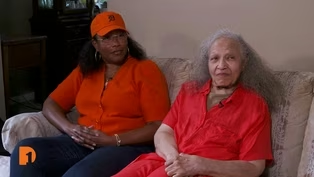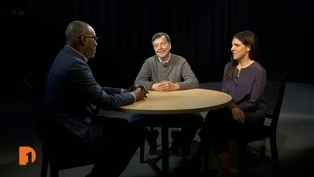
Tony Award-nominated performer Brandon Victor Dixon is coming to Detroit on November 15
Clip: Season 10 Episode 20 | 6m 18sVideo has Closed Captions
One Detroit spoke with the Grammy Award-winning actor and singer about his creative process and more
This weekend, Cabaret 313 will be featuring Grammy Award-winning actor and singer and acclaimed Broadway producer, Brandon Victor Dixon. Known for his roles in “Hamilton,” “Jesus Christ Superstar Live,” and “The Color Purple,” Dixon is bringing his vocal talents to Detroit on November 15, where he'll be performing at The Cube at the DSO Max M. and Marjorie S. Fisher Music Center.
Problems playing video? | Closed Captioning Feedback
Problems playing video? | Closed Captioning Feedback
One Detroit is a local public television program presented by Detroit PBS

Tony Award-nominated performer Brandon Victor Dixon is coming to Detroit on November 15
Clip: Season 10 Episode 20 | 6m 18sVideo has Closed Captions
This weekend, Cabaret 313 will be featuring Grammy Award-winning actor and singer and acclaimed Broadway producer, Brandon Victor Dixon. Known for his roles in “Hamilton,” “Jesus Christ Superstar Live,” and “The Color Purple,” Dixon is bringing his vocal talents to Detroit on November 15, where he'll be performing at The Cube at the DSO Max M. and Marjorie S. Fisher Music Center.
Problems playing video? | Closed Captioning Feedback
How to Watch One Detroit
One Detroit is available to stream on pbs.org and the free PBS App, available on iPhone, Apple TV, Android TV, Android smartphones, Amazon Fire TV, Amazon Fire Tablet, Roku, Samsung Smart TV, and Vizio.
Providing Support for PBS.org
Learn Moreabout PBS online sponsorship(dramatic music begins) - To get started, I wanna jump into your career on Broadway and on the stage.
I feel like you've played really dynamic characters, Aaron Burr, Judas, Harpo, Berry Gordy.
What is the process for tackling these characters, because they are such different men, both musically complex and morally complex?
- I mean, it really depends, but particularly for the individuals whom I portray who are real life people, really, it starts with research, just grounding myself in the things they had to say about themselves, and then the things that others had to say about them, and the context of the world in which they lived, they worked, and they made their impact.
That's primarily where I start.
When you talk about potentially the moral complications of any of the characters, I tend not to reckon with those things from an external point of view, I really try and deal with them from an internal point of view.
- And musically, I feel like these are very different characters as well.
Can you talk a little bit about the behind the scenes look of prepping for the musical side of tapping into these characters?
- Musically, it becomes about learning the material itself and then conditioning both my voice and conditioning my ear and my brain to the musical context into which they perform.
So finding their musical instincts, the kind of choices, the kind of improvisations that they would make, but primarily it's about technically conditioning my voice to that vocal style.
- Is there a role that affected you or maybe changed you the most?
Either as an artist or a person, a character that has kinda stayed with you?
- I think a number of them stay with me.
Judas stays with me a great deal, as does Haywood Patterson from Kander and Ebb's "The Scottsboro Boys."
I think because of the moral questions that, not necessarily the character, but the piece itself put forward for the audience, the moral questions about religion, community, revolution, zealotry, extremism.
So maybe those two stick with me the most, but they all stick with me.
- And then translating that to a cabaret stage, you get these big characters, these big storylines, obviously big musical numbers that are so attached to the long form story.
And then you're doing a cabaret performance with Cabaret 313.
It's more intimate, the audience is just a few feet away.
What changes for you in adapting from a Broadway stage with these big characters to a cabaret performance with people who are just right in front of you?
- In all honesty, not that much.
Because for me, art is storytelling and connection.
So whether I'm singing, or I'm dancing, or I'm acting, what I'm doing is I'm storytelling and I'm seeking to create a connection, a conduit between myself and the audience, whereby we can have an exchange and leave the environment different than when we came in.
We have learned something, we have reminded ourselves about something that we already knew, that we had forgotten to apply to our lives, and our friends, and our families, and our neighborhoods.
So that's what I'm doing when I'm on stage or when I'm on screen.
And it just becomes, I think maybe that much more intimate or more powerful when I'm present in a cabaret sitting.
- Not only are you a performer of the stage, of the screen, but you're also a producer as well.
How has working behind the scenes kinda shaped the way that you see theater as a whole?
- I think working behind the scenes has helped me to get a greater understanding of the ecosystem of theater as a whole.
I mean, we think of theater as one of the most collaborative mediums.
We talk about that a lot, particularly in kind of the internal artistic space.
But it really is true for the context of the whole, we're actors and singers on stage, but we have the creative team of directors, and stage managers, and costume builders, and set designers, and then they have teams of carpenters and electricians.
And there's just really a whole ecosystem of people that come together to make the piece.
- And speaking of that, what kind of stories do you want to bring to the stage as a producer into the future?
What are the stories that you're passionate about bringing to the public to have those conversations?
- I think the most important thing that art can do is raise our consciousness as human beings and connect us to each other on a deeper and greater level.
You know, art is the most powerful, exponentially powerful element that can bridge the gaps between communities.
Now, I wanna continue to bring stories forward to help break down the barriers between us as people, or at least break down the barriers we think exist between us as people, and help show the parallel relationships and emotional experiences and challenges that we all share, so that we can find ways to overcome these things together.
- For young artists who are in Detroit who are going to your performance at Cabaret 313, or are seeing this interview and are looking to follow a similar path to what you have successfully created for yourself, what advice would you give to those young artists who are looking to build a sustainable creative life?
- Well, I would say hold on to whatever you're picking up and you're soaking up in Detroit, because you all are the founts of creative, inspirational outpouring.
Detroit has created so many extraordinary artists.
So I would say hold onto that and continue to build infrastructure and community, because art begins on the ground and begins between the people who are around you.
Share your art with the people around you.
The most important thing about art is touching other people and growing your coalition.
Don't be afraid to start small and continue to work your way outwards.
- And then finally here, in closing, without giving too much away, what can audiences expect from Cabaret 313?
What kind of journey are you hoping to take Detroit on?
- They can expect some favorites, some favorites from the shows that I'm known for.
So you can get some of the things you're looking for, but then I'm definitely gonna bring you some new songs, some new arrangements, particularly off of my forthcoming album, which comes out in the spring.
So it'll be a mix of some of the familiar and then some new.
- I'm excited for it.
Brandon, thank you so much for joining us today.
- Thank you so much for having me.
Caregiving: Legal planning for the future
Video has Closed Captions
Clip: S10 Ep20 | 8m 17s | Discussing caregiving and planning for the future with an attorney and a mother and daughter. (8m 17s)
Ken Burns and Sarah Botstein Extended Interview
Clip: S10 Ep20 | 19m 36s | Ken Burns and Sarah Botstein on telling the story of “The American Revolution” in their docuseries. (19m 36s)
Providing Support for PBS.org
Learn Moreabout PBS online sponsorship
- News and Public Affairs

Top journalists deliver compelling original analysis of the hour's headlines.

- News and Public Affairs

FRONTLINE is investigative journalism that questions, explains and changes our world.












Support for PBS provided by:
One Detroit is a local public television program presented by Detroit PBS

